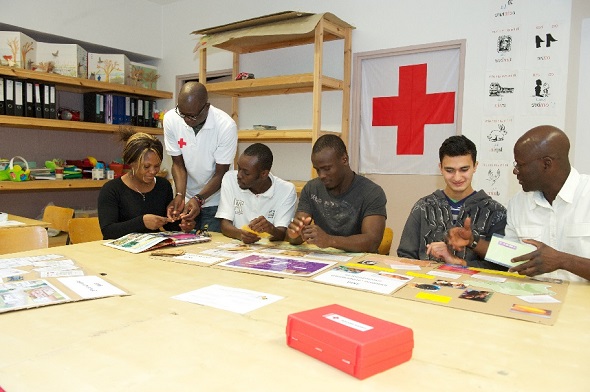Red Cross EU Office Conference on the EU Asylum Reception System
The Red Cross EU Office convened a public conference entitled "Emerging Challenges in the European Union Asylum Reception System” on 17 November 2015. The event was hosted by the Permanent Representation of Sweden to the European Union (EU), and included speakers from National Red Cross Societies in the EU, United Nations (UN) organisations, EU institutions and agencies, civil society organisations and Permanent Representations of Member States to the EU. Over the afternoon, discussions focused on two key challenges that the EU now faces: guaranteeing and implementing high reception standards across all EU Member States, and reaffirming intra-EU solidarity to support common rules and procedures that safeguard the dignity and rights of asylum seekers.
The debate was opened by Anders Ahnlid, Ambassador of the Permanent Representation of Sweden to the EU, who stressed that the current reception system is under strain with the arrival of unprecedented numbers of asylum seekers. However, he underlined the importance of upholding high reception standards for all asylum seekers.
The first panel focused on the implementation of the second phase of the Common European Asylum System (CEAS) by looking at key characteristics and pitfalls in the transposition of the EU Reception Conditions Directive. Mr. Ryan from the European Commission, presented some key provisions of the Directive which sets minimum standards of reception conditions for asylum applicants, and constitutes one of the legislative pillars of the CEAS. Jean Lambert, Member of the European Parliament (Greens/UK), stated that due to the lack of harmonisation between Member States, and their varying interpretation of the current legal framework, the CEAS has not yet been achieved. She also commended the role played by civil society organisations when welcoming asylum seekers on their first arrival.
Mr. Mouzourakis from the European Council on Refugees and Exiles (ECRE) called for a "coordinated approach that allows different stakeholders with varying expertise” to both guarantee that existing standards are respected, and share a collective desire to raise them. Ms Terres, Luxembourg Red Cross, concluded the first panel by addressing the key issue of vulnerable groups among asylum seekers, focussing more specifically on individuals suffering from severe mental disorders. She urged Member States to work earnestly towards the early identification of mental illnesses and to recognise the importance of a long-term perspective in regards to social integration.
The second panel focused on the challenges and prospects for the EU reception system in view of the current migration context. Ms Soisson from the Permanent Representation of Luxembourg to the EU, launched the debate by discussing the need for long-term capacities in relation to the implementation of the CEAS. She stressed the importance of Member States developing creative solutions and partnerships so as to better handle the pressures of the current migration situation. Mr. Cooper from the European Asylum Support Office (EASO), added that the EU agency is currently working with Member State authorities and migration experts to strengthen reception capacities, implement contingency planning, and examine reception conditions for vulnerable groups. Ms Cecilia Wikström, MEP (ALDE/Sweden), then stated that the current migration situation is a "test for the European asylum system and of European solidarity.” She continued by appealing to EU Member States to work towards an improved system of shared responsibilities throughout the whole Union.

Ms Vonkeman from the United Nations High Commissioner for Refugees (UNHCR), expressed her concern about the increasing hostility towards asylum seekers and refugees, and encouraged their "involvement within the community.” Whether through volunteering or early access to the labour market, participation in community activities can promote a more positive image of asylum seekers among European societies, as well as contribute to their integration. Finally, Ms Fridlund from the Swedish Red Cross, highlighted that effectively identifying and responding to the special needs of vulnerable asylum seekers remains a key challenge across the Union. Ms Fridlund maintained that early identification allows for vulnerabilities to be readily addressed, and ensures that the well-being and dignity of vulnerable asylum seekers are respected. Overall, discussions emphasised the necessity to uphold the dignity and rights of those who have turned to Europe for protection and safety.
Following the conference, National Red Cross Societies in the EU issued a joint Statement calling for dignified receptions standards to be maintained across the EU. Read it here.
See the Statement published in Euractiv here.
For media inquiries, please contact Eva Oyón on: eva.oyon@redcross.eu or +32 2 235 09 22

